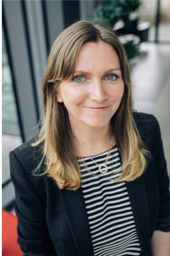
In this month’s Director’s Blog I introduce EEUK’s new Special Interest Group – Enterprise and Entrepreneurship Education for a Sustainable Society – and reflect on its official launch.
EEUK has always been at the forefront of pushing the boundaries of Enterprise Education. As the first and largest membership organisation for enterprise educators in the UK, it empowers us to champion issues that are important for the development of the field. EEUK has long acknowledged sustainability challenges. Its criteria for annual research funding seeks projects that address the relationship between Enterprise Education (EE) and environmental and planetary sustainability. It has supported various impact projects which enable members to develop their practice towards sustainability. It also hosts a track at the annual IEEC conference about EE and Sustainability. This Special Interest Group (SIG) proposal aims to expand and build on this existing provision by creating new opportunities for interested members to connect between these existing activities, and to advocate for, and accelerate shifts towards, a more sustainable society.
The seed for the SIG was planted during an EEUK funded project, ‘Enterprise Education and Planetary Boundaries: what can EE do?’ (Brentnall and Higgins, 2023), and developed through thinking about how change emerges through connecting people and ideas (Brentnall and Higgins, 2024). The application to EEUK for the Special Interest Group was informed by feed-in gained from EEUK members at a fringe event at IEEC 2023, and an online survey that followed, where views were sought about concerns and ways forward. Colleagues’ concerns spanned the personal and the professional. Personal concerns included feeling overwhelmed about the state of the world, worry that there was not enough urgency about the accelerating dangers of climate change and feeling the need to build personal resilience. Professional concerns were about the siloed nature of enterprise, entrepreneurship and sustainability in university teaching, that existing good practice about sustainability was not being applied across the board, and concerns that the growth and scaling focus of enterprise and entrepreneurship contributes to environmental and social problems.
The SIG was approved by the EEUK Board in October, and on December 11th, it was officially launched at Manchester Metropolitan University’s Innospace. One of the objectives of the SIG is to facilitate dialogue and learning about ideas and perspectives that could influence sustainable shifts. Related to this, the event included a keynote from Dr Melanie Rieback. Melanie is the CEO and co-founder of Radically Open Security, the world’s first not-for-profit computer security consultancy, and the founder of Nonprofit Ventures, a startup incubator dedicated to fostering post-growth start-up businesses. She teaches Post Growth Entrepreneurship at the University of Amsterdam.
Her talk was wider ranging, but some points and themes that stood out were:
- We have a big focus on ideation in start-up and enterprise culture, but not enough attention is paid to the legal structure part of education. Melanie has a laser focus on who owns a business and what happens to the value. She illustrated how an environmental or social business can end up being extractive if the profit motive gets built in via securing funding, servicing shareholders and growing for exit. Stewardship models, associations and golden shares are ways to try and manage and reduce extraction.
- In terms of ESG (Environmental, Social Governance), she discusses how there is a big focus on the ‘E’ (environmental) and some on the ‘S’ (social) but the dimension that drives harm, and which could be best harnessed for change is the ‘G’ (governance).
- Post growth doesn’t mean no growth for entrepreneurs. It means, bootstrapping and growing organically through customer revenue. It means maintaining flat growth and not going for external capital, it means developing sustainable business models which are based on fulfilling real need rather than financial extraction.
- Polarisation and politics means that issues that are existentially important – such as climate breakdown – have been turned into wedge issues and culture wars material. Entrepreneurs can reclaim some middle ground by building alternatives to extractive, harmful and exploitative business models. Melanie extended an invitation to the demo day for her post-growth entrepreneurship incubator, see here.
As well as Melanie’s talk, there was inspiration from EEUK members sharing ‘how they started’ and ‘where they were going’ with their sustainable shifts. Dr Trudie Murray, from Munster Technological University, Dr Adam Frost from the University of Manchester and Claire Pattison, from Manchester Metropolitan University’s Centre for Enterprise, covered in-curriculum, extra-curricular and business support and start-up sustainable shifts. Their slides, which were stuffed full of links and inspiration relating to their work, will be on the events page.
A really satisfying part of the day was the official launch of the SIG in the afternoon, with a welcome from EEUK president Dave Bolton, and an attempt to make a DIT – Do It Together – approach come to life. The group co-created aims and activities for the next three years. Then people proposed ideas for events and contributions they could make. From contributing to marketing to proposing research focused events and from organising online speaker sessions, to envisioning specific themed events, such as health, participants through about what they needed and could offer. Going forward, there will be at least three ways of getting involved. First, EEUK members can attend SIG events for free (the next one will be in the first quarter if the year and on-line). Second, EEUK members can join the SIG organising committee and take responsibility for organising something. Of course, a final way of being involved is staying informed – so please sign up for the SIG newsletter by dropping me a line at c.brentnall@mmu.ac.uk and follow our LinkedIn page.
The SIG launch was a mind-expanding and hopeful way to finish the academic year of 2024. Here’s to building community and working together in 2025.
